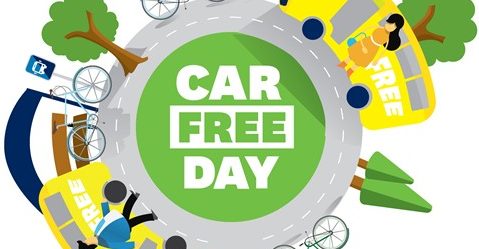Today, 22 September, is “World Car Free Day“. This is an annual celebration to encourage people to use active and sustainable modes of transport and to promote the benefits of going car free. According to recent research, New Zealand’s rate of car ownership is one of the highest in the world at 1.3 vehicles per person of driving age! [1]
As for my family, we have one car and most of the week it sits in the garage while my son, my husband and I cycle to school and work. We have the luxury of relatively short distances, flat terrain and mostly good cycling infrastructure in Christchurch. We benefit by enabling our exercise to be integrated into our daily lives, as well as the wellbeing, financial and social benefits – I often catch up with friends when I happen to meet them at the traffic lights.
On the flip side, many of my colleagues in Auckland struggle with longer commuting times, and less flexibility around travelling when and how they would like. This is due to crowding on public transport, juggling childcare responsibilities that often require drop offs in multiple locations (these trip types are more difficult by public transport), and a lack of connected and safe infrastructure to allow them to cycle even for part of their trips. These colleagues feel they don’t have any options other than travelling by car but it is not how they would like to travel.
The first COVID-19 lockdown earlier this year changed our team’s commuting behaviour, with many people taking the opportunity to use our “Flex-Abley” policy to work from home a couple of days a week. This has multiple wellbeing and sustainability benefits for both the individual and the planet. One colleague mentioned if he works from home he has time to fit exercise in and also to see his kids more.
These changes to our working arrangements don’t stop the urgent need to improve our neighbourhoods to make them more walking and cycling friendly so people can make more healthy and sustainable travel choices that fit their lifestyles.
Which brings me back to going car free. Perhaps that is too much of an audacious goal for many people to take on? Car free implies removing something we have become wedded to, due to its unrestricted mobility and convenience. Perhaps we could re-frame it to a more positive conversation about adding something in. One example is my colleague has recently started getting off the train one stop early to build in some walking time on his way to work and he feels better for it.
So although it’s World Car Free Day today, we should be thinking about how we can make more sustainable travel choices every day. Today highlights the issues but we need more than one day to keep us on track.
[1] Curl A, A Watkins, C McKerchar, D Exeter and A Macmillan (2020) Social impact assessment of mode shift. Waka Kotahi NZ Transport Agency research report 666, 113pp
Credit World Car Free image

.png?width=556&height=152&name=Abley_MasterLogo-Website%20(1).png)
.png?width=200&height=55&name=Abley_MasterLogoWhite-Website%20(1).png)

